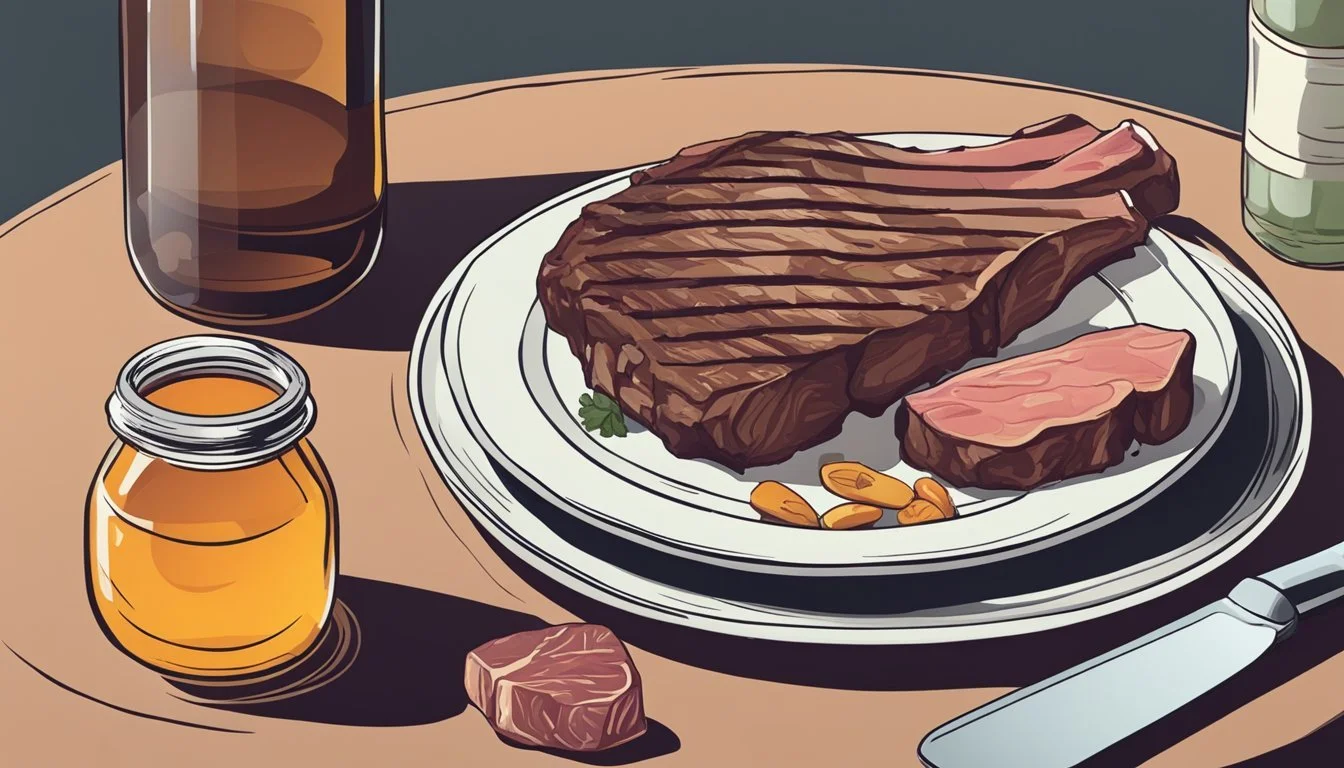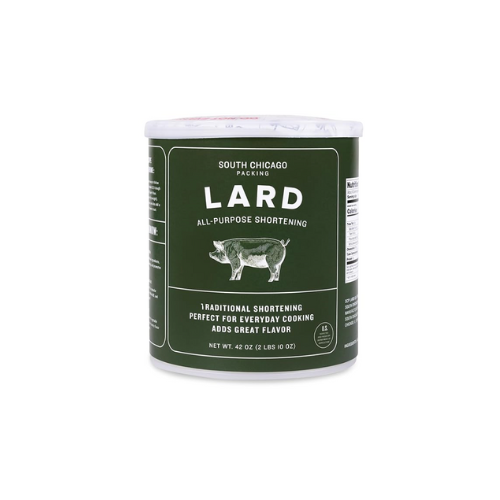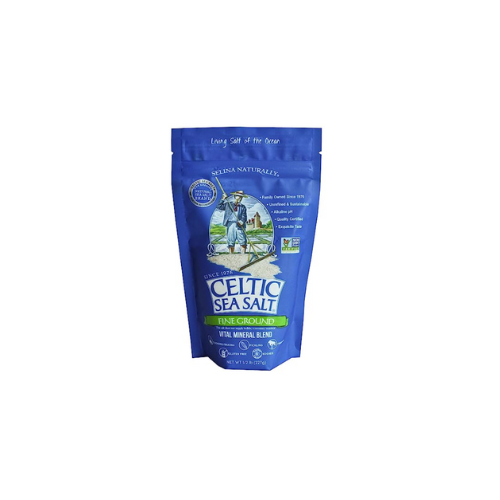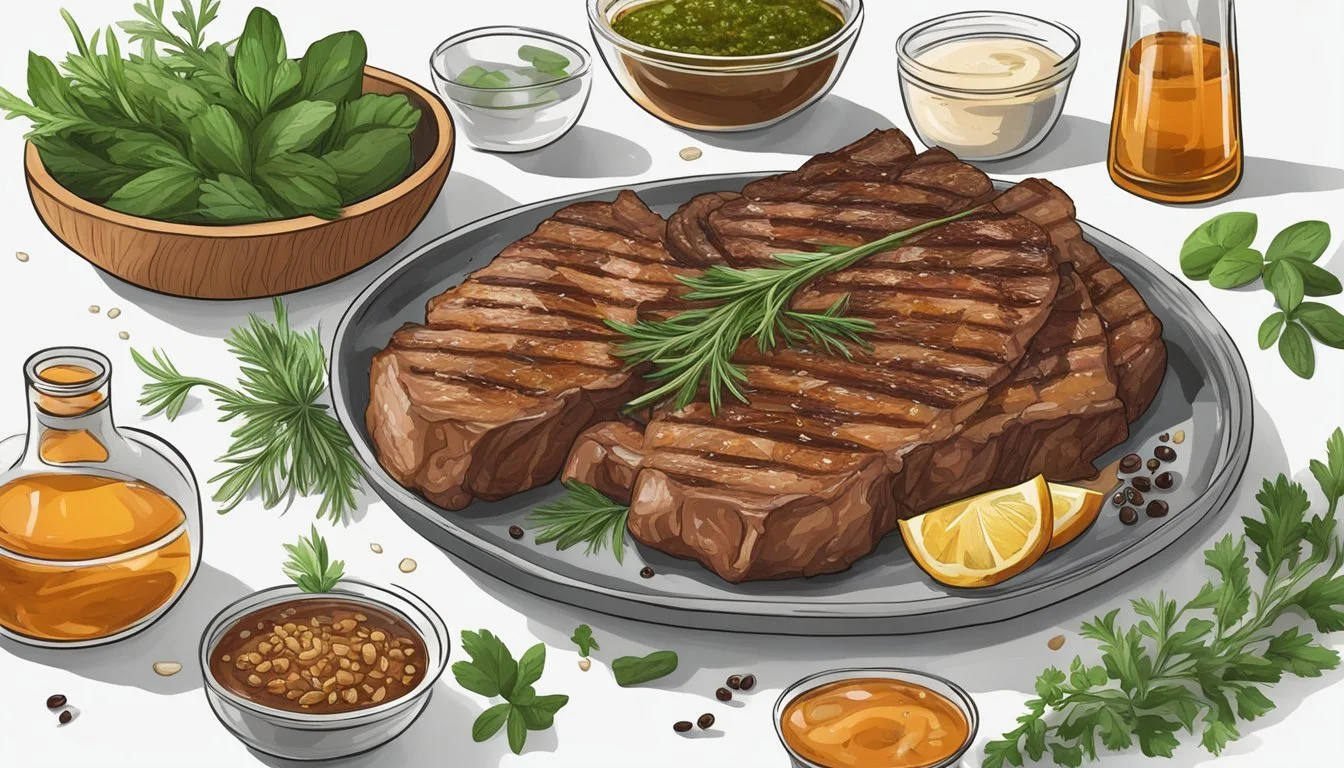Can You Have Vinegar on Carnivore Diet
Clarifying Condiment Choices
The carnivore diet, centered on animal-based foods, often raises questions about the inclusion of specific condiments and ingredients not derived directly from animals. One such item commonly debated is vinegar. The diet is premised on the consumption of meats and animal products, while excluding plant-based foods, to align with a philosophy of eating that is argued to be closer to what ancient humans consumed.
Vinegar, including varieties like white vinegar and apple cider vinegar, is a point of contention. Some proponents of the carnivore diet consider the use of vinegar acceptable due to its minimal carbohydrate content and potential digestive benefits. Others argue for a stricter approach, cutting out all plant-derived products to remain true to the diet's principles. The debate hinges on interpretations of dietary guidelines and individual goals within the framework of the carnivore lifestyle.
While white vinegar is made by fermenting grain alcohols and apple cider vinegar comes from fermented apple juice, both undergo substantial transformation from their original plant-based sources. The acceptability of vinegar in the carnivore diet may be influenced by personal dietary goals, health objectives, and the level of strictness one chooses to apply to their food choices.
Exploring the Carnivore Diet
The carnivore diet calls for the exclusive consumption of animal products and is touted for its simplification of eating habits and potential health benefits. This section articulates the diet’s framework, acceptable foods, reported health advantages, and addresses prevalent misunderstandings.
Definition and Principles
The carnivore diet is a regimen that eliminates all plant-based foods and exclusively centers on animal products. This high-protein, low-carb diet purports a return to a more ancestral way of eating. Adherents consume primarily meat, including beef, pork, and organ meats, as well as fish, seafood, eggs, and select dairy products.
Food List: What to Eat
On a carnivore diet, the emphasis is on consuming whole animal products. Below is a breakdown of the core components:
Meat: Beef, lamb, pork, and game
Organs: Liver, heart, kidney
Fish and Seafood: Salmon, mackerel, sardines
Eggs: Whole eggs
Dairy: Hard cheeses, butter (in moderation)
Fats: Animal fats like lard and tallow
Intake of processed meats should be limited due to added calories and additives.
I always prefer buying lard and tallow online because of the added convenience!
Potential Health Benefits
Proponents of the carnivore diet argue it may lead to weight loss, improved energy levels, and ketosis, a metabolic state often targeted for its fat-burning properties. Some suggest that a strictly carnivorous diet could reduce inflammation and symptoms of autoimmune diseases due to the elimination of plant-based foods. They also point to the diet's high content of essential vitamins and minerals from animal products.
Common Misconceptions
Common misconceptions include the belief that the diet offers a complete nutritional profile and that it is suitable for everyone. However, critics often cite a lack of science supporting the diet's long-term efficacy and safety. Concerns are raised about potential risks such as increased cholesterol, heart disease, and deficiencies in certain vitamins found predominantly in plant foods. Additionally, the idea that all saturated fats and cholesterol are inherently harmful is increasingly challenged within nutritional science.
Components of a Carnivore Diet
The carnivore diet primarily focuses on consuming animal products, emphasizing meats and completely excluding plant-based foods. This approach is intended to provide all necessary nutrients solely from animal sources.
Protein Sources
Proteins are the cornerstone of the carnivore diet, with the emphasis on animal meats. Red meat such as beef, lamb, and pork, including cuts like ribeye steaks and ground beef, are staples for their high-quality protein and nutrient density. Poultry like chicken and seafood such as fish, shrimp, and other shellfish also contribute significant protein content. Through these varied sources, the diet aims to supply essential amino acids needed for muscle maintenance and overall health.
Fats and Oils
Animal fats provide a concentrated source of energy and help in the absorption of fat-soluble vitamins such as Vitamin A and Vitamin E. Preferred fats include butter, lard, and fats inherent in meats, particularly those from pastured or grass-fed animals due to their better fatty acid profiles. Pure animal fats are chosen over industrial oils, which are usually excluded due to their processing and potential for containing additives.
Dairy Inclusion
While not universally accepted in the carnivore community, dairy products can be included, particularly those high in fat and low in lactose, such as cheese and butter. Full-fat dairy may offer additional fat content, energy, and minerals like calcium. However, consumption is often limited to ensure not to disrupt blood sugar levels and to align with the diet's primary focus on meat.
Eggs and Organs
Eggs are highly regarded in a carnivore diet for their protein and nutrient profile, including essential fatty acids and vitamins. Organ meats—including liver, kidneys, and bone marrow—are particularly nutrient-dense parts of the diet. They are a rich source of vitamins and minerals such as iron and zinc, essential for various bodily functions. Registered dietitians acknowledge organ meats as nutritional powerhouses, though their specific inclusion is based on individual preference within the carnivore diet framework.
Acceptable Beverages
In the context of a carnivore diet, beverage options are limited due to the strict nature of the diet. Readers should note that only certain drinks align with carnivore principles, primarily focusing on hydration and the avoidance of plant-based products.
Water Requirements
Water is the mainstay of hydration on the carnivore diet. It's essential for sustaining life and supporting the body's functions. Individuals following this diet should aim to consume an adequate amount of water daily to stay hydrated. The general guideline is to drink when thirsty and until satiated. There are no strict rules on water intake; however, it's recommended to:
Drink at least 8 glasses (64 ounces) a day
Increase intake if one is active or in higher temperatures
Listen to one's body for cues to drink more
Tea and Coffee
While the carnivore diet largely revolves around animal products, tea and coffee are often considered acceptable exceptions.
Tea: Unsweetened, plain tea is generally permitted as it is low in antinutrients and does not contain sugar or additives. Nevertheless, some purists may opt to exclude it to adhere strictly to animal products.
Coffee: As with tea, black coffee is generally allowed. It contains no calories, sugars, or carbs and can provide antioxidants. However, adding sugar, cream, or any flavorings deviates from the carnivore diet's guidelines.
When incorporating these beverages, it's crucial to monitor one's body's response, as the goal of the carnivore diet is to eliminate potential irritants and inflammatory foods.
Condiments and Spices
In the carnivore diet, one limits their intake to primarily animal products and often questions arise regarding seasonings. Certain condiments and spices are considered acceptable, although one must be mindful of the ingredients to adhere strictly to the diet principles.
Herbs and Seasonings
Herbs and seasonings can enhance the flavor of meat without adding carbohydrates or sugars. They should be used sparingly to retain the diet's focus on animal-based nutrition. Fresh herbs like rosemary and thyme are typically free of additives found in processed foods and can be used to season meats effectively.
Salt and Pepper
Salt is a fundamental seasoning in the carnivore diet used to enhance the natural flavor of meats. Sea salt is a preferred option due to its trace minerals and lack of additives. Pepper is widely used as well; however, individuals should inspect for any non-carnivore diet-friendly additives in pre-ground pepper varieties.
Skip the lines and order your sea salt, and pepper online for a stress-free shopping experience!
Vinegar Inclusion
Vinegar, particularly in its simpler forms like apple cider or white vinegar, is generally accepted on the carnivore diet in small quantities. It should be pure and free from added sugars or flavorings. Vinegar can help in tenderizing meat or adding a slight tang to dishes without compromising dietary guidelines.
For the most extensive selection, I suggest buying apple cider vinegar or white vinegar online!
What to Avoid on a Carnivore Diet
The carnivore diet prioritizes animal products and eliminates any foods that are not derived from animals. Adherence to this exclusion is key to maintaining the diet's framework.
Plant Food Exclusion
On a carnivore diet, all plant foods are avoided. This means no fruits, vegetables, nuts, grains, and fiber. The focus is solely on meat, fish, eggs, and certain dairy products. Plant foods, which are a primary source of carbohydrates and fiber, are eliminated to emphasize a high-fat, protein-centric intake.
Prohibited Condiments
Most common condiments like ketchup, mustard, and mayonnaise typically contain added sugars, chemicals, and vegetable oils, which are not permitted on a carnivore diet. Additionally, dressings that include non-animal product ingredients or sugars should also be excluded.
BBQ sauce and mayo often have sugars and vegetable oils.
Mustard and fish sauce might slip in additives and sugars, making them unsuitable.
Even lemon juice, used sparingly, is technically a fruit product and should be avoided.
Unsuitable Beverages
Beverages on a carnivore diet are restricted to water and animal-based drinks. Thus, all alcoholic beverages are off-limits, as they are derived from plant sources and can contain carbohydrates. Milk is sometimes included, but it can also be omitted due to its lactose (sugar) content.
Non-Animal Product Additives
Any additives not directly sourced from animals are not included in the carnivore diet. This particularly includes:
Apple cider vinegar, even though some may argue for its benefits, it's not a traditional animal product.
Artificial sweeteners and flavor enhancers often come with a host of chemicals.
Vegetable oils are replaced with animal fats such as lard, tallow, or butter.
Potential Health Considerations
When considering vinegar in the context of a carnivore diet, one should be aware of its potential impact on various health conditions and nutritional aspects. This section explores expert insights into vinegar's role and the risks and challenges it may pose to those adhering strictly to carnivore dietary principles.
Expert Insights
Experts in nutrition often highlight vinegar's potential benefits which include its ability to aid digestion and regulate blood sugar levels, which can be particularly beneficial for individuals with diabetes. Vinegar contains acetic acid, which has been linked to reduced appetite and the ability to help an individual lose weight. It is also a source of certain vitamins and minerals, such as vitamin C and magnesium, albeit in small amounts. Furthermore, vinegar's anti-inflammatory properties may assist in lowering the risk of heart disease.
Risks and Challenges
However, introducing vinegar to a carnivore diet presents certain risks and challenges. The primary concern lies in its plant-based origin, which may not align with the strict all-animal-product philosophy of the diet. Individuals with health issues related to high sodium intake should also be cautious as some vinegars, especially processed ones, can contain added sodium. Additionally, those with a history of acid reflux or gastritis might find that vinegar exacerbates their condition due to its acidity. While vinegar may offer some benefits, like contributing potassium and fatty acids, it lacks essential nutrients found predominantly in animal products, such as folate and certain fatty acids, and should not be relied upon as a nutritional source for individuals following a carnivore diet.
Carnivore Diet and Weight Loss
The Carnivore Diet focuses on consuming exclusively animal products and is often adopted for weight loss ambitions. Weight loss on this diet stems from its typically lower carbohydrate intake, pushing the body to utilize fat as its primary energy source.
Caloric Deficit: Central to weight loss is the creation of a caloric deficit. Despite the unrestricted consumption of meats and animal fats, individuals often consume fewer calories than on a standard diet due to satiety from high-protein intake.
Protein: High-protein diets have been associated with greater satiety and metabolism boost, aiding in a more effective weight loss journey.
Fat Metabolism: With carbohydrates restricted, the body may increase fat oxidation, mobilizing fat stores for energy, potentially leading to weight loss.
Here are important considerations:
Caloric Intake
Consideration: Monitor to maintain a deficit
Protein
Consideration: High intake to promote satiety
Fat Utilization
Consideration: Increased due to low carbohydrate availability
One should not overlook the importance of a well-rounded diet and the potential nutrient deficiencies a strict carnivore diet might imply. Consulting healthcare providers before making drastic dietary changes is recommended. They may also monitor the diet's effects on overall health, not just on the scale, to ensure that individuals lose weight safely and sustainably.
FAQs about Vinegar and the Carnivore Diet
Navigating the inclusion of vinegar on the carnivore diet raises questions about adherence to dietary restrictions and potential health benefits. This section addresses common inquiries related to vinegar within the confines of this diet.
Can You Have Vinegar on the Diet?
Vinegar is not a staple of the carnivore diet, which prioritizes animal products and typically excludes plant-based items. However, white vinegar, due to its minimal ingredient list, is sometimes considered acceptable by those following a less strict version of the diet. Apple cider vinegar, while popular for its health benefits, is derived from apples and therefore, is a point of contention among carnivore diet purists.
Best Types of Vinegar for Carnivore Diet
On the carnivore diet, selecting vinegar involves choosing types with the fewest additives and plant derivatives. Pure, distilled white vinegar, being the byproduct of ethanol fermentation, may be the best fit for this diet's strict criteria since it is less likely to contain plant-origin compounds compared to other vinegars.
Impact of Vinegar on Ketosis
The carnivore diet can lead an individual into a state of ketosis, where the body burns fat for energy in the absence of carbohydrates. Vinegar, particularly white vinegar, contains minimal carbohydrates and thus, is unlikely to disrupt ketosis. Some proponents argue that apple cider vinegar might even aid in maintaining ketosis by helping to stabilize blood sugar levels, although this is not universally accepted.
Note: It is always recommended to consult with a health care provider before making significant changes to one's diet.
Navigating Social Situations
When following a carnivore diet, individuals may face social scenarios that require navigation with confidence and clear communication. This section offers guidance on approaching eating out and parties, as well as effectively communicating one's dietary preferences.
Eating Out and Parties
When dining out or attending parties, one should identify options that align with the carnivore diet ahead of time. Restaurants often have meat-centric dishes that can be customized. For example:
Steakhouses: A safe haven for carnivore dieters.
Barbecue spots: Opt for smoked or grilled meats without sauce.
At parties, bringing one's own carnivore-friendly dish ensures there will be something suitable to eat, and it introduces others to the diet.
Tips for Eating Out and Parties:
Call ahead: Inquire about the menu and discuss modifications.
Focus on protein: Prioritize dishes that feature animal-based proteins.
Communicating Your Dietary Choices
Clear communication is vital when expressing dietary restrictions to friends, family, and hosts. It's important to convey the choices with respect and without imposing one's preferences on others. Here's how:
Be concise: "I'm following a carnivore diet, which is meat-based. I appreciate your understanding."
Offer suggestions: Suggest ways to accommodate your diet when necessary.
When Communicating:
Stay polite: Respect others' dietary choices while upholding your own.
Be prepared: Some may be curious; have a brief explanation ready.
Lifestyle Integration
Incorporating vinegar into a carnivore diet necessitates a mindful approach, ensuring the addition aligns with the diet's principles and one's personal health objectives. Users of the carnivore diet, such as Dr. Shawn Baker, an orthopedic surgeon and author known for his advocacy of an all-meat diet, argue for the consumption of animal-based products exclusively. However, many individuals contemplating the carnivore lifestyle may ponder whether vinegar is permissible.
Vinegar Types and Uses:
White Vinegar: Often debated, but generally considered acceptable for cleaning up meats or in minimal amounts for taste.
Red Wine Vinegar: Occasionally used to marinate meats or to enhance flavor, with the added benefit of antioxidants.
Quality Considerations:
Choosing vinegars of high quality with no added sugars or artificial ingredients is crucial. Pure vinegars, which are essentially fermented acetic acid, are favored over flavored or sweetened varieties.
Lifestyle Adaptation:
Those strictly adhering to the carnivore diet may opt to avoid vinegar initially.
Individuals can introduce vinegar gradually to monitor their body’s response.
It is important to prioritize one's health goals and dietary satisfaction.
Adaptability Table:
White Vinegar
Acceptable on Carnivore Diet: Sometimes
Considerations: No additives
Red Wine Vinegar
Acceptable on Carnivore Diet: Sometimes
Considerations: Nutrient profile, no additives
A user’s integration of vinegar into a carnivore diet should be undertaken with a clear understanding of how it may affect both physical health and psychological well-being, always adhering to the diet’s core tenets.
Concluding Thought
When assessing whether vinegar is acceptable to incorporate into a carnivore diet, individuals must consider the strict guidelines of the diet. The carnivore diet focuses on animal products and eliminates most plant-based foods, aiming to serve those with certain health objectives or dietary preferences.
The decision to include vinegar in this diet may hinge on a few considerations:
Purity: Vinegar, particularly white vinegar, is often free from sugars and additives. It may thus align with the diet's emphasis on natural, unprocessed foods.
Tolerance: Individuals may choose to introduce vinegar after an initial strict phase to test personal tolerance.
Variety: Vinegar can offer a flavor variation without adding carbohydrates, being mindful of the vinegar type.
However, it is crucial for individuals to remember that modifications to the original carnivore protocol might have implications on the diet's outcomes. Careful observation of the body's reaction to vinegars, especially fermented ones, is advisable.
Ultimately, the inclusion of vinegar in a carnivore diet is a personal choice, ideally made with awareness of its potential impact and the primary goals of the individual.
Note: It is always recommended to consult with a healthcare professional before making significant changes to one's diet.

















